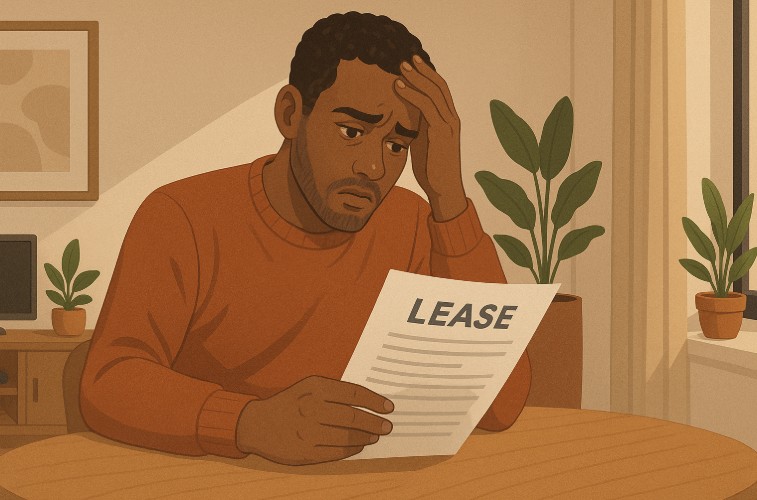Breaking a lease in Alberta can be a complicated decision, especially when unexpected life events or rental issues arise. Whether you’re facing noisy neighbours, unresolved maintenance problems, or simply need to move for work or family reasons, it’s essential to understand your rights and responsibilities as a tenant.
Alberta has clear legal guidelines on how and when a rental agreement can be ended, either by the tenant or landlord. If you’re unsure about how penalties work for early lease termination or want to avoid unnecessary fees, this guide covers everything you need to know.
From fixed-term contracts to periodic leases, we break down the legal, financial, and practical steps so you can make informed decisions. Let’s explore what happens when a lease is broken in Alberta and how you can protect yourself while staying compliant with tenancy laws.
Can You Legally Break a Lease Early in Alberta Without Penalty?

Yes, there are specific situations where you can legally break a lease early in Alberta without facing penalties. These typically involve breaches of the rental agreement by the landlord or circumstances affecting your health or safety.
If your landlord fails to provide essential services such as heat, water, or security, this may be considered a substantial breach. The same applies if you’re facing repeated disturbances from neighbours and the landlord refuses to intervene.
You may also legally end your lease without penalty if:
- The rental unit is uninhabitable due to issues like mould or persistent leaks
- There’s a health authority order against the property
- You’re fleeing domestic violence
- The landlord has violated housing standards under the Public Health Act
In these cases, tenants must give proper written notice, usually a 14-day notice, explaining the reasons for termination. This notice should include the rental address, your signature, and the date the tenancy will end.
Although these situations offer legal grounds, it’s always wise to consult with Alberta’s Residential Tenancy Dispute Resolution Service (RTDRS) or seek legal advice before ending the lease. Proper documentation will help support your case if a dispute arises.
What Are the Penalties for Breaking a Fixed-Term Lease in Alberta?
When a fixed-term lease is broken without legal grounds or mutual agreement, the tenant may be responsible for various penalties. A lease signed from January 1 to December 31, for example, is expected to run its full course. If you move out early, the consequences may depend on the terms outlined in your lease.
Typical Contractual Penalties:
- Forfeiture of the security deposit
- Payment of rent until a new tenant is found
- Responsibility for advertising costs and potential legal fees
Two Months’ rent Clauses:
Many Alberta leases include a clause requiring tenants to pay the equivalent of two months’ rent if they break the lease early. This fee compensates the landlord for potential income loss and time spent finding a new tenant.
When Mutual Agreement Matters?
Some landlords may allow you to terminate the lease early without penalty if you give proper notice and the reason is valid. In these cases, always get the agreement in writing.
| Scenario | Potential Penalty |
| Lease broken with no legal cause | 2 months’ rent or more |
| Tenant provides early notice, landlord agrees | Often waived or reduced |
| Fixed-term ends as scheduled | No penalty |
| Lease broken due to landlord breach | No penalty if proper notice given |
Before taking action, read your lease carefully and contact your landlord to discuss possible resolutions.
What Are Your Rights as a Tenant When Breaking a Lease?

Understanding your rights as a tenant is essential before making the decision to break a lease in Alberta. While landlords have the right to expect tenants to honour lease agreements, tenants are equally protected by provincial laws under certain conditions.
If you’re planning to leave early, it’s important to know when you’re legally justified, what obligations still apply, and how to avoid financial or legal trouble.
Tenant Rights Under the Residential Tenancies Act
The Residential Tenancies Act in Alberta outlines the rights and responsibilities of both tenants and landlords. You have the right to live in a rental property that is safe, clean, and properly maintained.
If the landlord fails to meet these standards or breaches the lease agreement, such as by not repairing heating systems or addressing major health concerns, you may have the legal right to terminate the lease early.
Tenants also have the right to challenge improper evictions, dispute unfair penalties, and seek resolution through the Residential Tenancy Dispute Resolution Service (RTDRS) if disagreements arise.
When Notice is Not Required?
There are special cases where you can end the lease without providing the standard notice period:
- If your landlord has committed a substantial breach, such as ignoring a health authority order or failing to provide essential services
- If you are fleeing domestic violence and have received the proper certificate from an authorized official
- If the property poses a serious risk to your health and safety, and no corrective action is taken by the landlord
In these cases, you must still give a 14-day written notice, but the standard 30- or 60-day notice rules do not apply.
When Landlord Must Be Notified?
In most situations, even if you have valid reasons to leave, notifying your landlord in writing is essential.
This written notice must include:
- Your full name
- The address of the rental property
- The date you intend to vacate
- Your signature
Providing written notice protects you legally and can help avoid disputes, especially regarding your security deposit. Always deliver it through a method that offers proof of delivery, such as email (with confirmation), in person, or via registered mail.
How Much Notice Must You Give to End a Lease?

Giving the right amount of notice is one of the most important steps in ending a lease in Alberta. The type of lease you have, fixed-term or periodic, determines how much time in advance you must inform your landlord.
Failing to give proper notice can lead to unwanted penalties, misunderstandings, or even the loss of your security deposit. By understanding the legal timelines, you can exit your tenancy smoothly and without legal consequences.
Differences Between Fixed-term and Periodic Leases
In a fixed-term lease, the agreement ends automatically on the date specified in the contract. You typically don’t need to provide notice if you plan to leave at the end of the term. However, if you intend to leave before the end date, written notice is still strongly advised to avoid disputes.
A periodic tenancy, on the other hand, requires formal notice regardless of when you plan to leave. This includes weekly, monthly, or yearly tenancies. The notice must be in writing and include your name, the rental property address, intended move-out date, and your signature.
Weekly, Monthly, and Yearly Tenancy Rules
- Weekly tenancy: You must provide at least one full tenancy week of notice.
- Monthly tenancy: You are required to give one full tenancy month of notice, and the landlord must provide three full tenancy months if they want to end it.
- Yearly tenancy: Tenants must give 60 days’ notice, while landlords must give 90 days, both before the end of the tenancy year.
Make sure your notice period ends on the final day of your rental period. This helps avoid confusion and delays.
Late Notice Implications
If you give late notice, your tenancy doesn’t end immediately after your intended date, it extends into the next full rental cycle.
For example:
- If your monthly tenancy runs from the 1st to the 30th, and you give notice on June 2, your lease will end on July 31, not June 30.
- Similarly, in yearly agreements, a late 60-day notice pushes the end date forward by two months.
To avoid complications, always review your lease and plan ahead. Timely, written communication is the best way to ensure a clean and legal lease termination.
What Happens to Your Security Deposit If You Break the Lease?
Security deposits in Alberta are protected under specific guidelines. If you break your lease early, the return of your deposit depends on several factors.
You may still get your deposit back if:
- There’s no damage beyond normal wear and tear
- The unit is properly cleaned
- All rent and utility bills are paid
- Proper notice is given
If you fail to meet these conditions, landlords can legally deduct the cost of repairs or unpaid rent. However, landlords cannot make deductions for cleaning or damages unless a move-in and move-out inspection report is completed.
If deductions are made, the landlord must provide:
- A detailed list of damages and costs within 10 days
- A final statement within 30 days if estimates were initially given
Keep all documents and send a written forwarding address to your landlord to ensure proper return.
What If the Landlord Has Broken the Agreement First?

If your landlord fails to meet legal responsibilities, you may have the right to break the lease without penalty.
A substantial breach could include:
- Failure to maintain the property to minimum health standards
- Ignoring health orders issued under the Public Health Act
- Not providing essential services like heat or water
In such cases, you’re allowed to give a 14-day notice to terminate your lease early.
This notice should include:
- The address of the property
- The reason for early termination
- The end date of tenancy
- Your signature
If the landlord disputes the breach in writing within seven days and corrects the issue, the notice may become void. Document all communications and complaints to support your case if needed later.
Can You Dispute Lease Penalties in Alberta?
Yes, if you believe you’re being charged unfairly for breaking a lease, you can file a dispute through Alberta’s Residential Tenancy Dispute Resolution Service (RTDRS).
Valid grounds to dispute penalties include:
- Landlord did not mitigate damages by re-renting promptly
- You had legal reasons to terminate the lease
- Excessive or unsupported deductions from your security deposit
When Filing a Dispute?
- Submit all relevant documents, like your lease agreement, communication records, inspection reports, and photos
- You can apply online or by mail
- RTDRS decisions are binding and enforceable
In complex cases, consider legal advice from tenant support services or a lawyer. Alberta’s Consumer Contact Centre can also provide direction on your rights.
What Are Alternatives to Breaking a Lease in Alberta?
If you want to end your lease early without penalties, explore legal alternatives first.
Alberta tenancy law allows for options that may reduce or eliminate costs:
- Subletting: You can sublet the rental unit to another tenant with landlord approval
- Assignment: Transfer your lease to someone else who will take over all terms
- Negotiate: Discuss early termination directly with the landlord, they may agree if they can find another tenant
- Workplace Transfers: Some landlords may waive penalties for job-related moves
Always get any agreement in writing. These alternatives not only save money but also help maintain your rental history in good standing.
Should You Break Your Lease in Alberta?

Breaking a lease in Alberta is not a decision to take lightly. It carries both legal and financial consequences, but sometimes circumstances make it necessary.
Whether you’re dealing with health concerns, personal safety, or serious issues with the rental property, knowing when and how to walk away can protect your rights. Let’s look at how to evaluate your options carefully and responsibly.
Weighing Financial Cost vs. Living Situation
When considering ending your lease, start by evaluating whether staying is worth the stress and cost. Living in an environment with constant disturbances, such as excessive noise, mould, flooding, or broken heating, can severely impact your physical and mental well-being. These conditions may lead to anxiety, poor sleep, and even illness, especially if the landlord refuses to take action.
Now compare that to the potential penalty of paying one or two months’ rent to end the lease. In some cases, the emotional toll and health risks far outweigh the cost of termination. If the situation continues to decline despite repeated communication with the landlord, it may be time to consider ending the lease as a necessary expense rather than a loss.
Legal Advice and Next Steps
If you’re uncertain about your rights or the next steps, always start by reading your lease agreement thoroughly. Alberta’s tenancy laws can vary depending on your situation, so professional guidance is highly recommended.
You can contact the Consumer Contact Centre at 310-0000 (toll-free within Alberta) for reliable and free advice on tenant rights and responsibilities.
Another resource is the Residential Tenancy Dispute Resolution Service (RTDRS), which helps resolve conflicts between landlords and tenants without needing to go to court. If you believe you’re being treated unfairly or penalized without legal grounds, this is your path for action.
When It’s Worth the Penalty?
There are situations where paying a lease-breaking penalty is justified, and even beneficial. If the rental property becomes unsafe, unsanitary, or uninhabitable, and your landlord refuses to respond after reasonable notice, you may have legal justification to leave. In some cases, though, you might not qualify for a penalty-free exit under the law but still find that paying a fee is the better alternative for your peace of mind and well-being.
No rental is worth sacrificing your health or quality of life. Consider your personal safety, mental health, and the long-term impact of staying in a stressful living situation. Sometimes, choosing to pay the penalty is the most responsible and proactive decision you can make.
In the end, breaking your lease should be a well-informed choice. Explore all your options, understand your legal standing, and consult with professionals if needed. Your home should be a place of comfort and safety, not ongoing distress.
Lease Termination Notice Periods in Alberta
In Alberta, the amount of notice you must provide depends on the type of tenancy agreement and who is ending it.
Here is a helpful breakdown:
| Type of Tenancy | Tenant Notice | Landlord Notice |
| Weekly | One full week | One full week |
| Monthly | One full month | Three full months |
| Yearly | 60 days before lease ends | 90 days before lease ends |
If either party gives late notice, the lease will end at the end of the next complete term. Always deliver written notice, signed and dated, to avoid disputes.
Conclusion
Breaking a lease in Alberta doesn’t have to be overwhelming if you understand your rights and follow proper legal procedures. While fixed-term leases come with responsibilities, there are valid situations where you can end your tenancy early without penalty.
Knowing when and how to notify your landlord, the impact on your security deposit, and your legal options can protect you financially and legally.
If you’re ever in doubt, seek help from the Residential Tenancy Dispute Resolution Service or Alberta’s Consumer Contact Centre. Your living environment matters, and with the right information, you can make confident decisions that reflect your needs and legal rights.
FAQs
Can I break my lease early in Alberta if the furnace or plumbing fails?
Yes, if your landlord doesn’t fix essential services like heat or plumbing, you may have grounds to terminate the lease with notice.
What if my lease includes a penalty for breaking it early?
You’re still responsible unless there’s a legal reason for termination or a mutual agreement with the landlord.
Do I lose my security deposit if I end the lease early?
Not always. You can receive your deposit back if the unit is clean, undamaged, and rent is paid.
Is two months’ rent the standard penalty in Alberta for breaking a lease?
It’s common but not fixed by law. It depends on your lease terms and whether the landlord re-rents quickly.
How do I file a lease dispute in Alberta?
You can file online with the Residential Tenancy Dispute Resolution Service or contact Alberta’s Consumer Contact Centre.
Can I sublet my rental instead of breaking the lease?
Yes, with landlord approval. Subletting allows someone else to take over the rental and may avoid penalties.
What if the landlord breaches the lease agreement first?
You can legally end the lease with written notice if the landlord violates health standards or tenancy terms.




